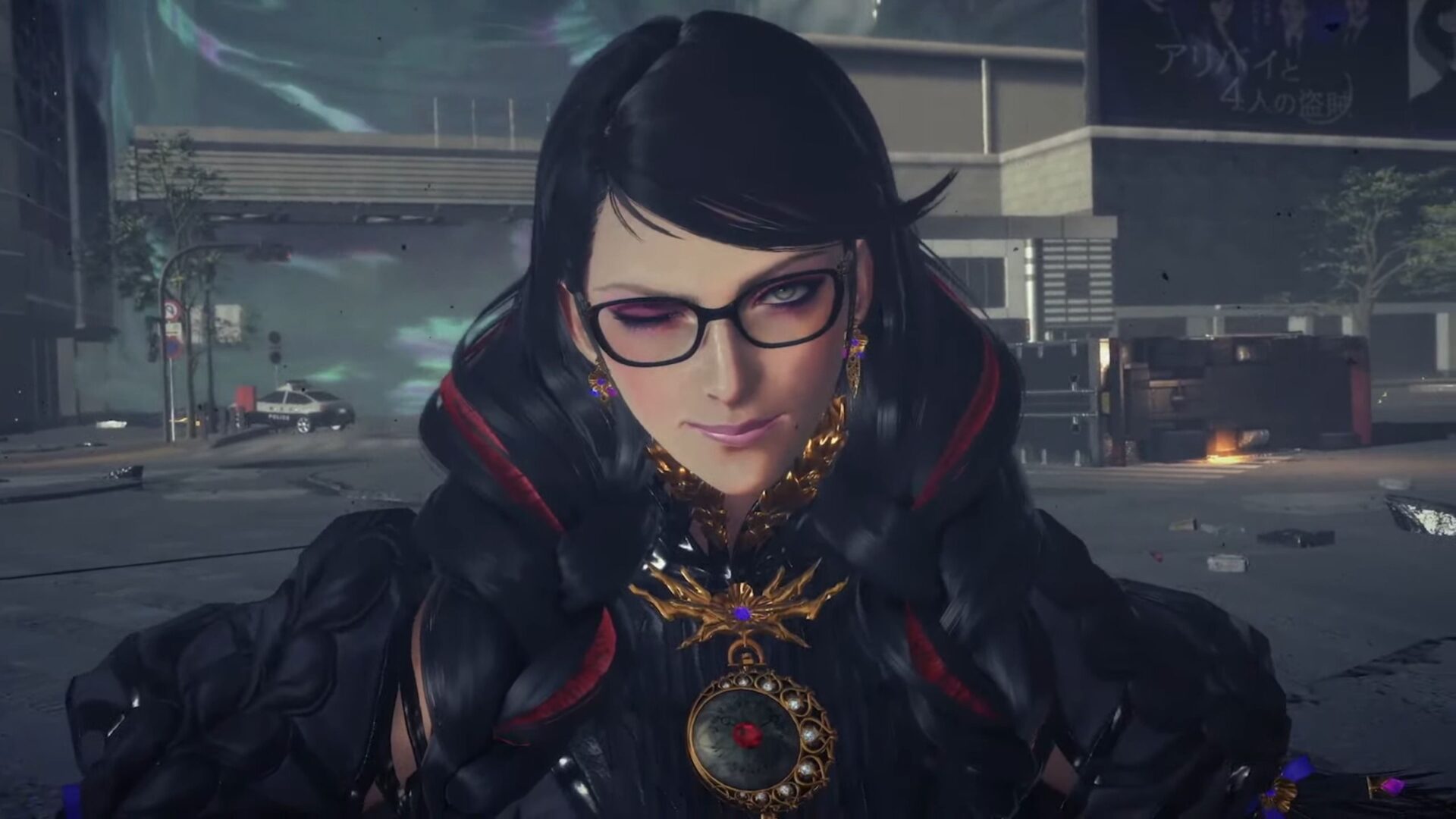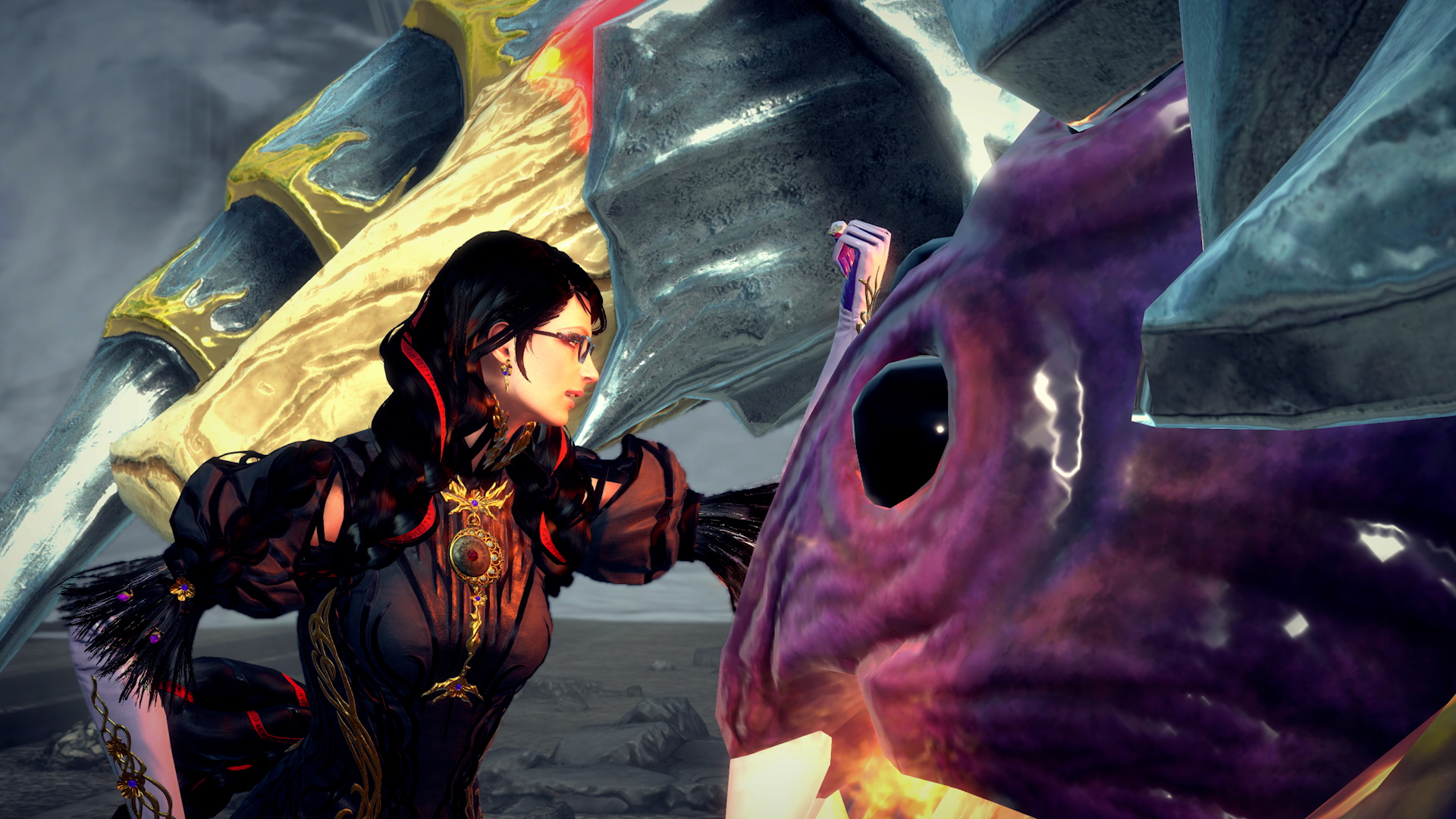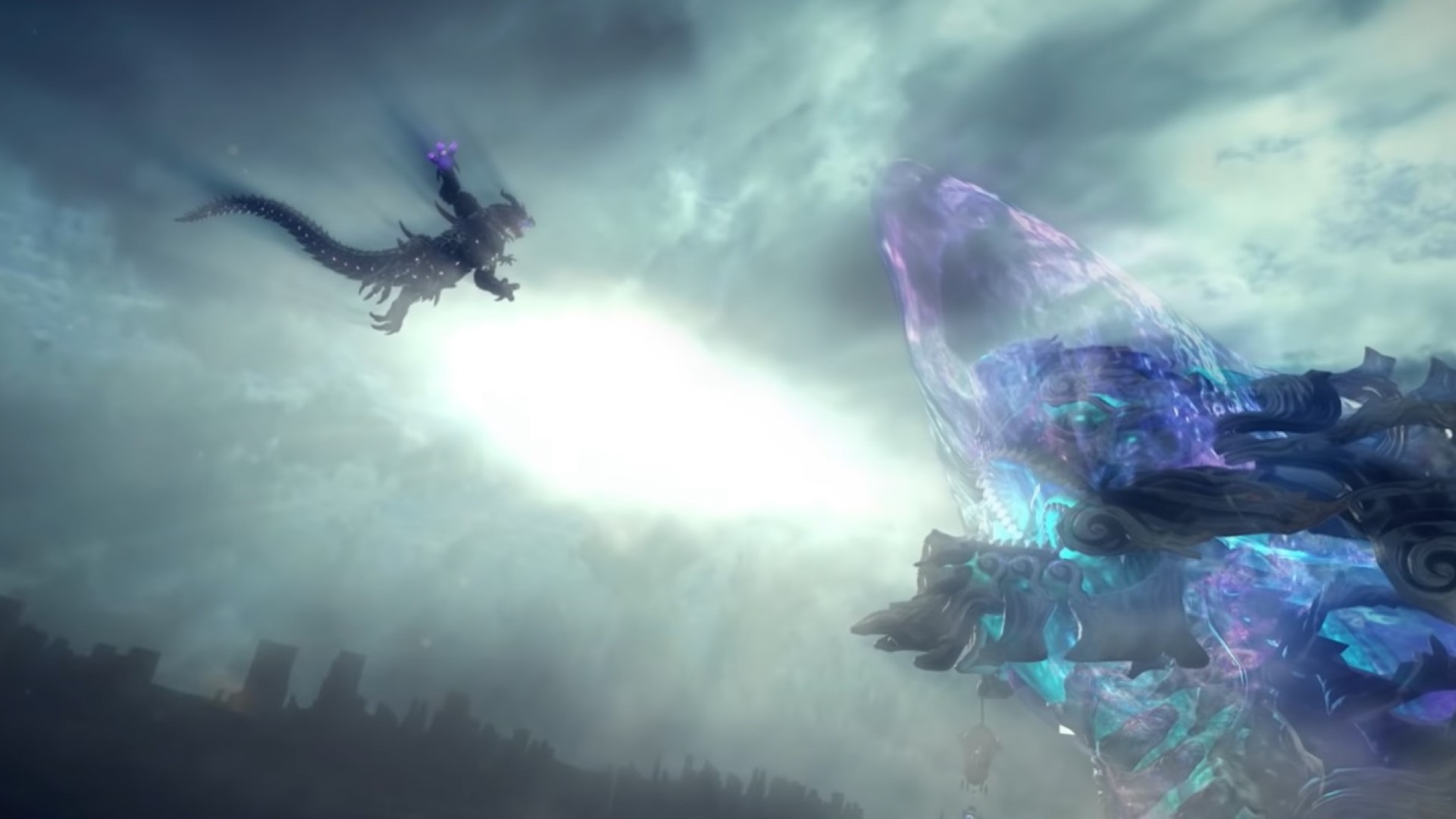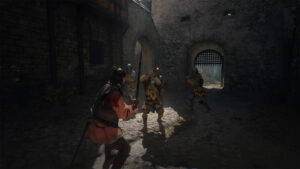
Bayonetta 3 starts out by having all of New York City collapse in on itself in a glorious multiverse consuming tsunami of mind blowing proportions. This isn’t a spoiler – very literally, the first real level in the game is this. This is the tutorial, the prologue, the introductory mission. This is how the game starts. It’s an audacious statement of intent, and an amazing bit of setting the stage, because your expectation that the game may have blown its load way too early is then repeatedly proven wrong with every single chapter and set piece the game throws at you. Bayonetta 3 is a game that revels in a frankly absurd and ridiculous amount of excess, imbibing the kind of deranged and insane spectacle that, for example, modern God of War games do not, moving from one comprehension defying fight and set piece to the next, until very soon, it all really blurs into a glorious background cacophony of visual noise, all while you focus on what this series is best at – the combat.
Combat in Bayonetta 3 takes all the best things from the first two games, and polishes them to a sheen, while also addressing the flaws that people feel each of those two titles’ combat systems had. What this means, then, is the reliance on sudden QTEs (ala Bayonetta 1) and the oevrreliance on Umbran Climax (this was in 2) is gone here. You still have the same basic kick, punch, and gunshot attacks, and you still have Bayonetta’s stylish dodge, timing which perfectly still triggers the Witch Time state that slows all other enemies down and lets you let loose at them with a series of glorious attacks.
Bayonetta’s combat caught the imagination of people like it did for one very simple reason – it is just the right amount of prescriptive, allowing players to chain together moves and unleash some pretty stunning moves on screen in the process. Bayonetta 3 delivers on this concept spectacularly – it feels like no matter what combination of inputs you try, the game will reward you with something, and it almost seems to gently nudge you from starting out button mashing (if you’re a newcomer) to slowly starting to string together proper combos, by encouraging you to try to everything you can, and then rewarding you with some truly great looking moves when you happen upon one of the many combos that will become an ongoing part of your repertoire from there on out.

"Bayonetta 3 is a game that revels in a frankly absurd and ridiculous amount of excess, imbibing the kind of deranged and insane spectacle that, for example, modern God of War games do not, moving from one comprehension defying fight and set piece to the next, until very soon, it all really blurs into a glorious background cacophony of visual noise, all while you focus on what this series is best at – the combat."
This emphasis on the core fundamentals of the combat doesn’t mean that Bayonetta 3 doesn’t have any spins of its own on the series’ now well established and iterated upon core formula, mind you. The Demon Masquerade is this game’s big new addition to combat, allowing you to fuse with a demon and then letting you wreak havoc on everything in some pretty out there finishing moves; Demon Slave is a variation of this technique that allows you to summon and control a whole other demon and have it fight enemies for you. These techniques are both tied to the Magic Meter (which now fills in combat constantly) and add a whole other dimension to combat, for multiple reasons. Primarily, this is because these techniques require you to constantly maintain them, which means you have to balance their massive damage with making sure you’re not letting these demons dissipate from the field, but also because each demon has its own form, its own strength, its own weaknesses, and its own suitability to different kinds of combat scenario, and leveraging the right demon in the right battle can lead to some incredibly satisfying results.
These demons aren’t the only change, either – also changing in this game is the weapon system, which now bestows a totally unique move set to Bayonetta each time you equip a new weapon (rather than relying on you equipping different weapons to her different limbs). This functionally means each new weapon is a whole new move set unto itself – and, once again, each weapon has its own properties, that make it well suited to some combat scenarios, and poor at others. Being able to mix and match your traditional combat with the demon summoning and the whole weapon system leads to a frankly dizzying array of options, each with the same amount of depth and versatility that you expect from the series. Finishing the campaign still only feels like you’re scratching hing the surface of everything this game’s combat has to offer – and, indeed, in true Bayonetta fashion, the true depths of what this game can allow you as the player to do will not be plumbed until you go back to its various combat encounters and really let loose.
And all of this is – somehow – not even considering Viola (the new character this game introduces, who lacks Bayonetta’s insane versatility, but has a really well fleshed out combat style centred on her Samurai Sword) or Jeanne (whom you take control of in some inspired 2D segments). The amount of gameplay variety Bayonetta 3 offers is mind boggling, given that it is the kind of game that it is. And all of it is wrapped up in some of the most deranged, over the top, absurd spectacle that I remember in a very long time, spectacle that is so outrageously audacious that it borders on being sheer lunacy (pun very much intended). I started this review by describing the New York City opening – and I cannot stress this enough, that is just the beginning. The game somehow goes bigger and crazier from there. You’ll notice that this video review itself doesn’t actually include many areas beyond the first handful, and that is because the insanity of those is best experienced by yourself. The constant “seriously, they topped that?” That this game constantly pulls may be its biggest asset, and is very much not something that should be spoiled.

"As effusive with praise for the game as I have been so far, it does make two very major stumbles that I think mar it more than I wish they did. The elephant in the room here is the game’s technical proficiency, which is… not the best."
As effusive with praise for the game as I have been so far, it does make two very major stumbles that I think mar it more than I wish they did. The elephant in the room here is the game’s technical proficiency, which is… not the best.
Look, the Nintendo Switch is nearly six years old at this point, and even when it launched, it wasn’t really a powerhouse. In and of itself, this is not a problem, and games designed around the Switch can and do still surprise (Monster Hunter Rise was just last year, and Kirby and the Forgotten Land was a gorgeous outing just a few months ago). But it’s a system the limitations of which must be kept in mind and worked around when you’re developing a game, and Bayonetta 3…. Doesn’t do that, really. Of all the many, many games I have played on the Switch, this is the first one that feels utterly beyond the console’s capabilities. The Switch does put forth a valiant effort to keep up, but we’re talking about resolution dips to sub-HD levels (in handheld mode, it often goes even lower), and a frame rate that does have random dips and spikes (which can be especially bothersome in a game like this). On the whole, both these problems are mercifully constrained – well, not the resolution as much, but the resolution is also something you stop caring about after the first ten minutes or so. The framerate is a bigger problem with actual implications for how the game plays. Thankfully, frame rate issues crop up infrequently – but they still occur far more frequently than it should. Very honestly, Bayonetta 2 felt like a better looking and performing game in 2014 than Bayonetta 3 does now, in 2022. And while on one hand it is admirable that Platinum did not let their ambitions be restrained by the Switch hardware, on the other, why on earth did they not develop or design around said hardware? That’s supposed to be the whole point and appeal of an exclusive game, it fully leverages the strengths of its host hardware, and works around its weaknesses. Bayonetta 3 is definitely one of the most technically impressive games on the Switch – but it shows the seams and runs into the limits of the hardware, visibly, far too often. It is officially time for new hardware, Nintendo.
Technical issues aside, the other big failing of the game is the story. Bayonetta 3 has an incredible opening, and it ups the stakes and teases a villain bigger and better than anything in the series yet, and then it just… doesn’t do anything with any of that? Not only that, but the resolution it volunteers for its titular character feels not the best, and I feel like in the long run, that conclusion is what will be held against the game the most. For whatever it’s worth, no one really cares about the story in Bayonetta (including the game itself), and the story is incredibly de-emphasized in this game, as with most other games in the genre, but… on some level, the ending feels like an unforced error, and a fumble that the series has shown us multiple times it is capable of avoiding (but somehow fails to this time around).

"While it fumbles with the story, and frequently butts heads with its host system’s technical limitations, Bayonetta 3 is masterfully accomplished at all the things that matter, and all the things it needs to be great at. You’re doing yourself a disservice if you don’t check it out, warts and all."
The story is probably something most players will be able to overlook, but the technical shortcomings of the Nintendo Switch, and the visible and tangible effect they have on the game itself, were harder for me to ignore. The Switch is my favorite system, and wherever and whenever possible, I choose to play a game on there – but this title marked one of the rare times I found myself wishing I could be playing it on something else, because as much as I like the Switch, it doesn’t feel like it was the right canvas for Platinum’s ambition. As mentioned, again, this is not as big of an issue as it could be, and most of the game maintains a steady framerate (and truly sells that aforementioned spectacle convincingly), but this is absolutely not the ideal way to play this game. I can only hope that a future Nintendo system will allow this game to really shine.
Issues and all, however, Bayonetta 3 is a spectacular game. If you’re a fan of the genre, this is a must play. If you’re a fan of the series, this is a must play. If you’re a fan of the kind of insane spectacle that the old God of War games had, but gave up with their modern entries, this is a must play. If you care at all about combat in video games, this is a must play. While it fumbles with the story, and frequently butts heads with its host system’s technical limitations, Bayonetta 3 is masterfully accomplished at all the things that matter, and all the things it needs to be great at. You’re doing yourself a disservice if you don’t check it out, warts and all.
This game was reviewed on Nintendo Switch.
Great combat that polishes the core the series is known for to a sheen, while addressing the complaints levied at previous games; this game's new additions to the combat system all work out incredibly well; a frankly insane and lunatic amount of spectacle that threatens to boggle the mind; an incredible variety and range in gameplay and mechanics that may well be unmatched in the genre.
The technical shortcomings are fairly major, and while it doesn't happen often, they DO intrude upon the gameplay experience more than they should; the story fumbles majorly towards the end.
















